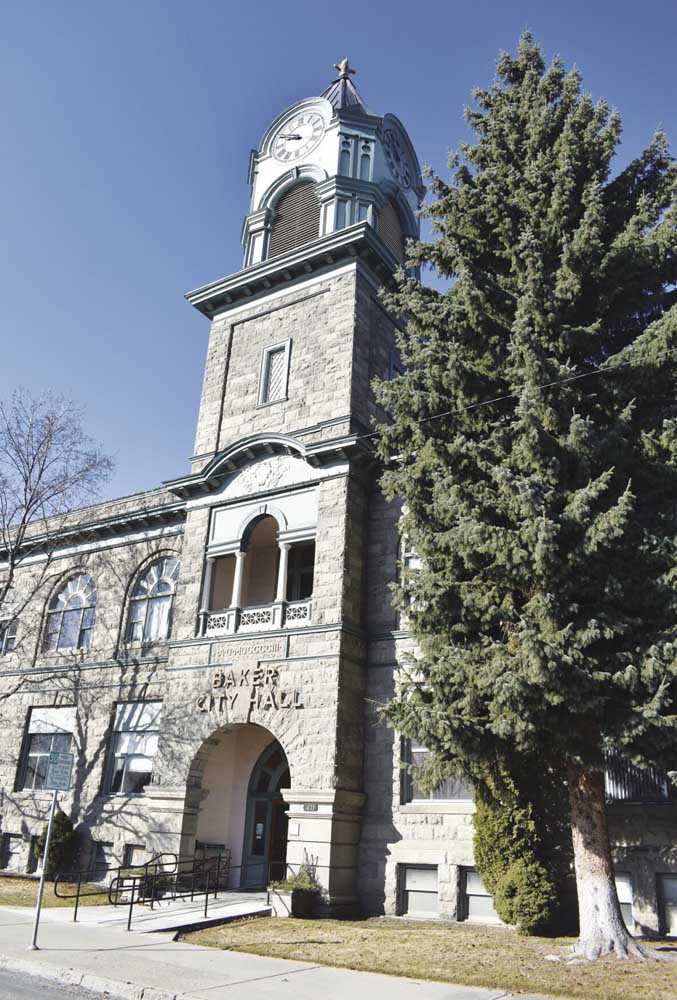Baker City Council considering pot nuisance ordinance
Published 1:00 pm Thursday, March 28, 2024

- Baker City Hall.
BAKER CITY — The Baker City Council is considering an ordinance intended to limit odors, noise and other effects from properties where marijuana is legally grown.
The city has received complaints about one property, at 3335 Birch St. in the northeast corner of the city.
Stephanie Barger, who has lived at 920½ H St., just west of the Birch Street property, for 16 years, talked to the council about her concerns during the Jan. 23 meeting.
Last year Barger sent a letter to the city council in which she wrote that noise from fans on the Birch Street property left her with “no peace and tranquility on my own property,” and that odor from the plants was also a problem.
Barger asked the council to adopt a “reasonable marijuana odor ordinance for both recreational and medical marijuana growers in residential areas within city limits.”
Angelina Gomez, who lives at 3335 Birch St., attended the council’s March 12 meeting and addressed both the complaints and the proposed ordinance.
Councilors haven’t taken any action on the ordinance.
“I thought it best that the council hear the full story and the clear, inaccurate statements being said in regards to us,” Gomez said.
She said she and her husband have a greenhouse in their backyard that is a medical marijuana grow site registered through the state. Gomez said they also received permits for the greenhouse construction from the city in 2021.
The greenhouse is 1,152 square feet, according to the Baker County Assessor’s Office.
“We were completely transparent for the intended purpose as well,” Gomez said. “My husband and I both hold a medical marijuana card, which is regulated by the state of Oregon and the OHA (Oregon Health Authority), which have the right to inspect our growth site at any time.”
Gomez said a state inspector visited their property last year based on a complaint from a neighbor. There were no violations, she said.
According to the Oregon Health Authority, which oversees the Oregon Medical Marijuana Program, to qualify as a licensed grower, a person:
• Must be 21 or older.
• Cannot have been convicted of a Class A or Class B felony under ORS 475.752 to 475.920 for the manufacture or delivery of a controlled substance in Schedule I or Schedule II within the previous two years or more than once.
• Cannot be growing for more than 8 patients at a time.
• Cannot grow more than 6 mature plants per patient.
• Must abide by the mature plant maximum determined by their grow site address zoning.
Gomez told councilors that she and her husband comply with the limit on the number of plants.
“I honestly can’t even count how many times the police or sheriff’s department have come to our home and have always found us to be in compliance,” Gomez said. “And if you ask me, it’s borderline harassment on my neighbors’ behalf. Any of you can go through the police logs and see the calls made against us.
“If one were to simply look at the escalation of events, it really makes you wonder if this is truly a noise issue, an odor issue, or just not liking the plant itself,” Gomez said.
She presented the city council with copies of signatures from neighbors who share a fence with them or are in close proximity who do not take offense to the medical marijuana in their greenhouse.
Gomez also gave councilors the inspection from a state compliance specialist.
Police Chief Ty Duby said police officers have visited Gomez’s property several times in response to complaints about noise and odor.
The initial call, more than a year ago, was about the legality of the growing operation.
Duby said officers talked with Gomez and her husband and confirmed that they were licensed growers.
Duby said officers, after listening to the fans in the greenhouse, concluded that the sound could potentially constitute a violation of the city’s property maintenance ordinance, which prohibits “disturbing or unnecessary noise.” The ordinance reads, in part: “Operating a blower, power fan, internal combustion engine, electric motor or compressor, or the compression of air, unless the sound from each machine is sufficiently muffled so as not to disturb the sleep, peace, quiet, comfort or repose of persons more than 30 feet away.”
Duby said Gomez told officers that the city planning department had approved the design of the greenhouse, including the fans.
As for odor complaints, Duby said there is nothing in the city ordinance that specifically deals with odors from marijuana plants.
Barger reviewed ordinances that other cities, including Ashland and Pendleton, have passed.
In May 2015 the Pendleton City Council amended the city’s nuisance ordinance, adding a section titled “Odors and Perceptible Effects of Presence of Marijuana.”
The section states, in part, that “No owner of real property or person in charge thereof shall allow, permit or cause the odor of marijuana to emanate from that premises to any other property.”
In her 2023 letter to the city council, Barger asked that “residents refrain from growing their plants within 10 ft. of their property line and require all growers both new and existing growers have their businesses fitted with deep bed activated carbon filter system so that the neighborhoods have clean air and a lot less complaints to local law enforcement.”
Baker City’s proposed ordinance would be separate, rather than an addition to the nuisance ordinance.
City Recorder Megan Langan said the proposed ordinance is based in part on one in effect in Linn County in western Oregon.
The proposed rule lists requirements for new businesses that “produce, process, wholesale, retail, research, or test marijuana.”
The proposed ordinance includes restrictions on when marijuana grow lights can be illuminated, and requires buildings where marijuana is grown to be equipped with an activated carbon filtration system and to maintain negative air pressure.
Gomez told councilors she’s not convinced a citywide ordinance is needed.
She said she and her husband, following complaints, installed a filter on the exhaust fan in the greenhouse that reduces both odors and noise.
Gomez said they plan to buy an activated carbon filter that she said would reduce odor by 99%.
“I don’t know if an ordinance should be established for the entire town, based off a small group complaint, especially when the majority of my neighbors do not find my marijuana offensive,” Gomez told councilors. “But we have no problem with complying to a fair and reasonable odor ordinance.”
Councilor Doni Bruland said she is leery of the council approving any ordinance that deals with odors.
“I mean, it’s going to start with marijuana but what happens when someone takes offense of the Sorbenots smell of burned coffee during the day?” Bruland said. “At what point does this ball stop rolling? It starts with marijuana, does it go then to something else?”
Councilor Nic Carman agreed, citing the smell of cigarette smoke as an example of something that offends some people.
Amanda Baker, a former code enforcement officer, said she had “a ton” of odor complaints regarding marijuana.
“I think you could write an ordinance but I would leave room so that they can still grow their plants in a way that’s also affordable,” Baker told councilors. “I’m sure there’s ways to limit it during harvest season.”






